'Book Mystique Review: Proporta 4 Port USB Compact Hub Ideal For MacBook Air, and Musings On Earl Grey Tea
Wednesday, May 21, 2008
by Charles W. Moore
Among the MacBook Air’s several functional and feature deficiencies, the provision of just one, lonely USB port on a machine that depends so heavily on its USB interface for I/O and peripherals support due to a complete absence of Ethernet and FireWire ports (Ethernet is available though an optional - you guessed it - USB adapter) is arguably the Air’s most grievous practical shortcoming. Even the optional external optical drive interfaces through that poor little overworked USB port. You can’t connect a wired mouse and keyboard simultaneously unless the latter has a USB repeater port, something more and more rarely included on today’s crop of keyboards, and even some wireless input devices (eg: Kensington products) require a USB dongle receiver. Then there are USB mics for those of us who use dictation software or Internet telephony. My Revolabs USB microphone has a USB-connected receiver. Hooking up printers or scanners will have to be via USB unless you have wireless units, as will downloading photos from a digital camera.
Of course, the counter-argument is that the Air is designed and intended for predominantly wireless connectivity, but in the real world that is still often more an ideal than a practical reality.
And while I’m at it, for that matter I find the measly two USB ports on the MacBook and 15” MacBook Pro (and my PowerBook G4) pathetically inadequate. I keep a four-port powered USB hub connected to my PowerBook most of the time and still end up plugging and unplugging stuff frequently, and when I get an Intel ‘Book, I will have to add an external USB modem, being stuck for now with dialup Internet. At least the 17” MacBook Pro has three USB ports, which is about the number most PC laptops come with (frequently more).
THen there’s the recently reported revelation that the MacBook and MacBook Pro’s two USB ports are not created equal, with only one of them supporting a full powered, full speed bus. Nor is it just MacBooks. I’ve found that the right USB port on my 1.33 GHz G4 PowerBook, a model that debuted in September, 2003, doesn’t supply enough juice to spin up one of my external USB 2 hard drives (which has a relatively low power demand 4200 RPM 2.5” notebook drive in situ), although my G3 iBook and Pismo PowerBooks seem to have no trouble bus-powering that drive. However, with the PowerBook I’m obliged to hook it up to an external power brick.
Back in August, 2007, ZNet’s David Berlind posted a technical article on this topic that’s worth checking out if you’re interested in the topic:
http://blogs.zdnet.com/Berlind/?p=736&tag=btxcsim
Berlind notes that while all USB ports offer 5 volts, amperage (ie: volume of power) available can vary substantially which is an important factor when it comes to bus-powering devices like external hard drives. The standard amperage is 500 milliamps (ma), but some computers, or even different ports in the same computer, sometimes offer more, which means that if your external hard drive won’t power up from one USB port on your ‘Book, it’s worth a shot at least trying it in another before rummaging around for a power brick.
Anyway, the long and short of it, especially with the MacBook Air and most likely with one of the larger ‘Books as well, is that you’re going to need a USB hub, and one that very nicely compliments the Air’s compactness and portability is the subject of this review - Proporta’s 4 Port USB Compact Hub, whose trim dimensions and feather-light weight let it fit comfortably in a shirt pocket or purse, and it also has a USB male connector small enough to fit comfortably in the MacBook Air’s recessed USB port.
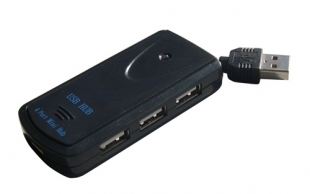
A very classy touch with Proporta products is that they ship (worldwide starting at $2.95) with complementary packets of real British tea, such as the Earl Grey Tea by Taylor’s of Harrogate (Family Tea Merchants; est. 1886) that came with our review unit. More on the Earl Grey in a bit.
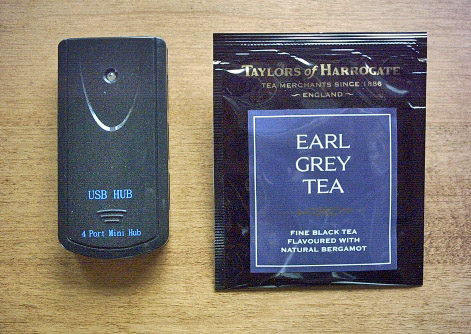
The Proporta hub quite sharp-looking too, with a metallic charcoal finish, and a blue indicator LED that glows when the unit is powered up either via bus power or an optional dedicated five volt power supply.
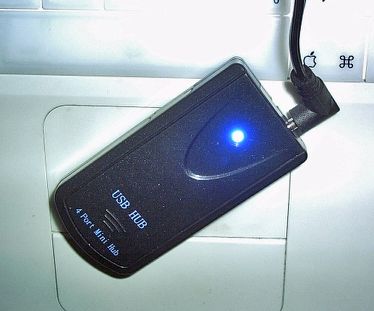
The Proporta 4-Port USB Compact Hub is about the size and shape of a jumbo pack of chewing gum and with a smaller footprint than a PC Card, although it’s thicker. The USB plug, which lives at the end of a very short cable extension, conveniently and neatly tucks into a dedicated recess in the bottom of the hub housing for storage and transport.
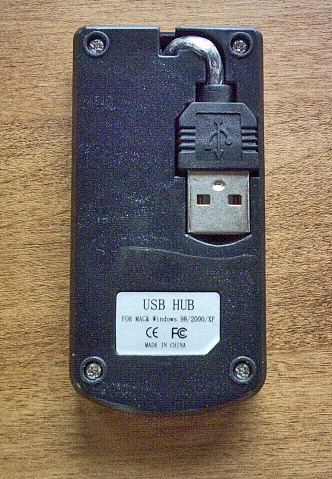
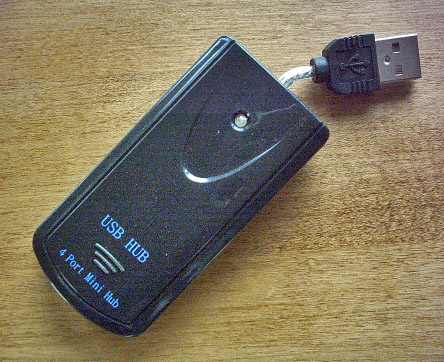
Three of the Proporta hub’s four USB ports are arrayed along the right-hand side of the unit, while the fourth lives at the bottom. There is also a socket for a standard 1/8” power supply connector jack at the top (USB plug) end of the housing.
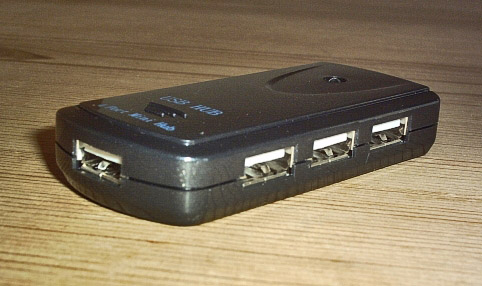
Construction and materials quality appear to be first-rate, and no drivers or software installation are needed with a Mac. It’s pure plug in and play.
The MacBook Air is something of a carriage-trade laptop, so while at $29.95 the Proporta unit isn’t the cheapest compact USB hub on the market, its slightly upmarket quality and positioning make it an appropriate match for the Air, as does the inclusion of that complimentary Earl Grey tea sample.
If you;re not a tea-drinker (pity!), Earl Grey tea is a delightful scented blend with a distinctive flavour and aroma derived from the addition of oil extracted from the rind of the bergamot orange, a fragrant citrus fruit that has been described as tasting like a combination of orange, lemon, and grapefruit. Whatever, it’s got a seductive aroma and a delightful flavor, and according to Darren McGrady in “Eating Royalty,”
“Earl Grey is the most-often served tea at Buckingham Palace.”
The Earl Grey blend is named after the 2nd Earl Grey, who was British Prime Minister from 1830-1834, during whose time in office the act was passed abolishing slavery in the British Empire. Legend has it that the Earl received a gift of special tea flavored with bergamot oil from a far eastern nobleman, variously cited as a Chinese mandarin or an Indian raja whose son had respectively been saved from drowning, or from a tiger, by Lord Grey’s soldier. Traditionally the term “Earl Grey” was applied only to bergamot-flavored black tea; however if it originated in China it’s more likely that the gift Lord Grey received would have been made with green tea, and today there are literally hundreds of Earl Grey tea blends on the market, including indeed bergamot-flavored green teas, white teas and oolong. Personally, I’m very partial to Tetley’s Earl Grey green tea, but the Taylor’s sample (black tea) is very nice and gets highly positive reviews from tea experts.
Taylor’s is one of the most respected names in the British tea industry (and worldwide), has been in business for more than 100 years, and is still family-owned. They operate on a fair trade policy and have received The Queen’s Award for Enterprise for Sustainable Development and Business in the Community.
Trekkies will recall that Earl Grey tea is the favored by beverage favored Commander Jean-Luc Picard of Star Trek: The Next Generation, and other fictional pop-culture Earl Grey fanciers include Ian Fleming’s original James Bond (I don’t recall any Earl Grey references in the Bond films, alas), Batman’s alter-ego Bruce Wayne, NYPD Blue’s Bobby Simone, A.A. Milne’s Piglet of the Pooh Bear books, P. G. Wodehouse’s Bertie Wooster (for afternoon tea, Darjeeling at breakfast — Taylors of Harrogate also makes Darjeeling Breakfast Tea), and Frasier Crane of Frasier. An eclectic lot, what?
From a herbal medicine perspective, teas, especially green and white varieties, are acclaimed as being high in free-radical fighting antioxidants, while the catechin and fluoride content of black tea help prevent tooth decay, its anti-microbial action helps fight infection, and caffeine’s qualities are well-known (decaf. Earl Grey is also available, and black tea has half the amount of caffeine of coffee and far less than Coca Cola; among the popular types of tea, green tea contains the least caffeine). Green tea is claimed to be 25 times more potent than Vitamin E at shielding cells from free radical damage that causes cancer and heart disease, while polyphenols abundant in green tea may also help protect women against breast cancer and ovarian cancer. Green tea’s high fluoride content inhibits tooth decay, and flavonoid content helps prevent halitosis, and it is believed to lower blood cholesterol, help prevent high blood pressure, and kill the influenza virus. Bergamot’s main herbal properties are as a disinfectant and an antidepressant whose ester and alcohol content is said to help reduce anxiety by calming the nervous system, while its antiseptic and germicidal qualities are said to alleviate bad breath, protect against and oral infections and fight flu, fevers and colds. Not bad for something that tastes so good.
Just be careful not to spill Earl Grey on your MacBook’s keyboard!
Back on our main topic to wrap things up, the Proporta 4-Port USB compact Hub sells for $ 29.95 When you purchase 4 Port USB Compact Hub you can take advantage of a discount on the Proporta Car Power Supply with USB Socket (regularly $ 8.95; bundled with hub $ 8.06).
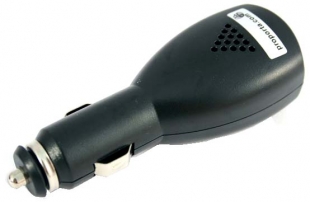
For more information, visit:
http://www.proporta.com/F02/PPF02P05.php?t_id=874&t_mode=des
Note: Letters to PowerBook Mystique Mailbag may or may not be published at the editor's discretion. Correspondents' email addresses will NOT be published unless the correspondent specifically requests publication. Letters may be edited for length and/or context.
Opinions expressed in postings to PowerBook Mystique MailBag are owned by the respective correspondents and not necessarily shared or endorsed by the Editor and/or PowerBook Central management.
If you would prefer that your message not appear in PowerBook Mystique Mailbag, we would still like to hear from you. Just clearly mark your message "NOT FOR PUBLICATION," and it will not be published.
CM